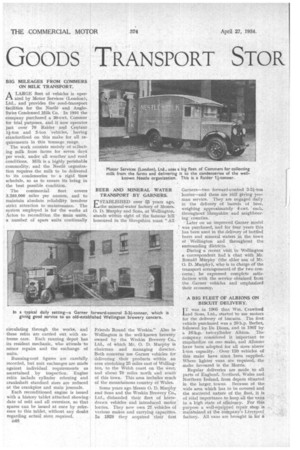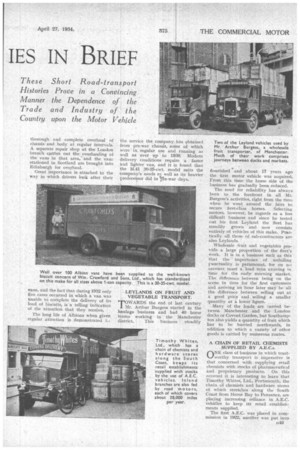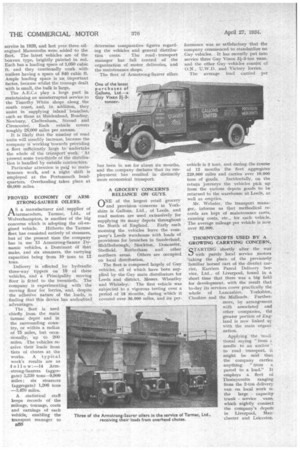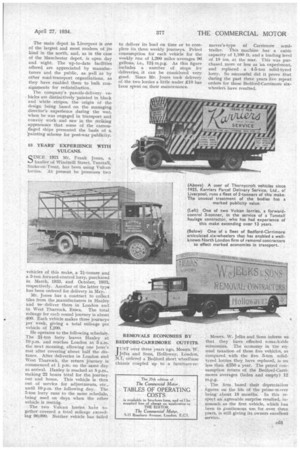GOODS TRANSPORT STOR TES IN BRIEF
Page 114

Page 115

Page 116

Page 117

If you've noticed an error in this article please click here to report it so we can fix it.
ALARGE fleet of vehicles is operated by Motor Services (London); Ltd., and provides the road-transport facilities for the Nestle and AngloSwiss Condensed ilrfilk Co. In 1031 the company purchased a 30-cwt. Commer for trial purposes, and it now operates just over 70 Raider and Centaur• 1i-ton and 2-ton vehicles, having standardized on this make for all requirements in this tonnage range.
The work consists mainly of ccllecting milk from farms for seven days per week, under all weather and road conditions Milk is a highly perishable commodity, and the Nestle organization requires the milk to be delivered to its condenseries to a rigid time schedule, so as to ensure its being in the best possible condition.
The commercial fleet covers 3,250,000 miles per annum, and to maintain absolute reliability involves strict attention to maintenance. The system employed is for the works at Acton to recondition the main units, a number of spare units continually circulating through the works, and these refits are carried out with extreme care. Each running depot has its resident mechanic, who attends to minor repairs and the exchange of units.
Running-cost figures are carefully recorded, but unit exchanges are made against individual requirements as ascertained by inspection. Engine refits include cylinder reboring and crankshaft standard sizes are reduced at the crankpins and main journals.
Each reconditioned engine is issued with a history tablet attached showing date Of refit and all oversizes, so that spares can be issued at once by reference to this tablet, without any doubt regarding actual sizes required.
D48 BEER AND MINERAL WATER TRANSPORT BY GARNERS.
ESTABLISHED over 3.5 years ago, the mineral-water factory of Messrs. 0. D. Murphy and Sons, at Wellington, stands within sight of the famous hill honoured in the Shropshire toast "All Friends Round the Wrekin." Also in Wellington is the well-known breweky 'awned by the Wrekin Brewery Co.. Ltd., of Which Mr. O. D. Murphy is chairman and managing director. Both concerns use Garner vehicles for delivering their products within an area stretching 25 miles east of Wellington, to the Welsh coast on the West, and about 70 miles north and south of this town. This area includes much of the mountainous country of Wales.
Some years ago Messrs 0. D. lkfurphy and Sons and the Wrekin Brewery Co., Ltd., disbanded their fleet of hofsedrawn vehicles and introduced motor lorries. They now own 27. vehicles of various makes and carrying capacities. In 1928 they acquired their first
Garners—two forward-control 3-3i-ton lorries—and these are Still giving yeoman service. They are engaged daily in the delivery of barrels of beer, weighing approximately 4 cwt. each, throughout Shropshire and neighbouring connties.
• Later on -an improved Garner model ! was purchased, and for four years this has been used in the delivery of bottled beers and mineral waters in the town of Wellington and throughout the surrounding districts.
• During a recent visit to Wellington correspondent had a chat with Mr. Ronald Murphy (the elder son of Mr. 0. D. Murphy), who is in charge Of the transport arrangement§ of the two concerns; he expressed complete satisfaction with the service obtained from the Garner vehicles and emphasized their economy.
A BIG FLEET OF ALBIONS ON BISCUIT DELIVERY.
I T was in 1905 that WM. Crawford and Sons, Ltd., started to use motors for the delivery of biscuits. The first vehicle purchased was a 20 h.p. Berliet, followed by De Dions, and in 1907 by. a 16 h.:p. two-cylinder Albion. The company considered it important to. standardize on one make, and Albions have been adopted for all sizes. above 1-ton capacity. Over 120 vehicleS of this make have since been supplied., Where lighter -vans are required, the make favoured is the Morris.
Regular deliveries are made to all parts of England, Scotland, Wales and Northern Ireland, from depots situated in the larger. towns. Because of the. wide area which has to be covered and the scattered nature of the fleet, it is of vital importance tcr keep all the vansin a high state of efficiency. For this purpose a well-equipped repair.shppis maintained at the coMpany's Liverpool factory. All vans are brought in for thorough and complete overhaul of chassis and body at regular intervals. A separate repair shop at the London branch carries out the overhauling of the vans in that area,-and the vans stationed in Scotland are brought into Edinburgh for overhaul.
Great importance is attached to the way in which drivers look after their vans, and the fact that during 1932 only five cases occurred in which a van was unable to complete the delivery of its load of biscuits, is a telling indication of the attention that they receive.
The long life of Albions when given regular attention is demonstrated L, the Service the company has obtained from pre-war chassis, some of which were in regular use and running as well as ever up to 1930. Modern delivery conditions require a faster and lighter van, and it is found that the M.41 30-35-cwt. model suits the Company's needs as well as its heavier predecessor did in e-war days.
LEYLANDS ON FRUIT AND VEGETABLE TRANSPORT.
TOWARDS the end of last century Mr. Arthur Burgess started in the haulage business and had 40 horse teams working in the Manchester district. This business steadily flourished and about 17 years ago the first motor vehicle was acquired. From this time the horse side of the business has gradually been reduced.
The need for reliability has always been to the forefront in all Mr. Burgess's activities, right from the time when he went around the fairs to secure first-class horses. Selecting motors, however, he regards as a less difficult business and since he tested out his first Leyland the fleet has steadily grown and now consists entirely of vehicles of this make. Priv!: tically all those of sub-contractors are also Leylands
Wholesale fruit and vegetables provide a large proportion of the fleet's work. It is in a business such as this that the importance of unfailing punctuality is paramount, for on no account must a load miss arriving in time for . the early morning market. The difference between being on the scene in time for the first customers and arriving an hour later may be all the difference between selling out at a good price and selling a smaller quantity at a lower figure.
Many of the loads are carried between Manchester and the London docks or Covent Garden, but Southampton also yields a quantity of fruit which has to he hurried northwards, in addition to which a variety of other goods is carried by numerous routes.
A CHAIN OF RETAIL CHEMISTS
SUPPLIED BY A.E.C.s. (-NNE class of business in which trustV./worthy transport is imperative is that concerned with supplying retail chemists with Stocks of pharmaceutical and proprietary products. On this account it is interesting to learn that Timothy Whites, Ltd., Portsmouth, the chain of chemists and hardware stores of which stretches along the South Cciast from Herne Bay to Penzance, are placing increasing reliance in A.E.C. vehicles to keep its retail establishments supplied.
The first A.E.C. was placed in commission in 1922; another was put into. service in 1929, and last year three oilengined Mammoths were added to the fleet. The latest vehicles are of the boxya.n type, brightly painted in red. Each has a loading space of 1,050 cubic ft. and they continually work with trailers having a space of 840 cubic ft Ample loading space is an important factor, because whilst the tonnage dealt with is small, the bulk is large.
The A.E.C.s play a large part in maintaining an uninterrupted service to the Timothy White shops along the south coast, and, in addition, they assist in supplying inland branches. such as those at Maidenhead, Reading, Newbury, . Cheltenham, Stroud and Cirencester. Each vehicle covers roughly 28;000 miles per annum.
It is likely that the number of road units will steadily increase, because the company iS -working 'towards prOviding a fleet sufficiently large to undertake the whole of the transport work. At present some two:thirds of the distribution is handled by outside contractors;
Particular attention is paid to maintenance work, and a night shift is employed at the Portsmouth headquarters. Overhauling takes place at 60,000 .miles.
PROVED ECONOMY OF ARMSTRONG-SAURER OILERS.
AS a manufacturer and supplier of tarrnacadam, Tarmac, Ltd., of Wolverhampton, is another of the big concerns which is adopting the oil-en
gined vehicle. Hitherto the Tarmac fleet has consisted entirely of steamers, but at the present time the company has in use 13 Armstrong-Saurer Dynamic vehicles, a Dominant Of that make, and six steamers, the carrying capacities being from 10 tons to 12 tons.
Delivery is effected. by hydraulic three-way tippers on 19 of these vehicles, and a Principality . moving floor is fitted to the twentieth. . The company is experimenting with the moving floor for lorries, and, despite the adhesive nature of the loads, is finding that this device has undoubted advantages. .
The . fleet is 'used chiefly from the main tarmac depot and in the surrounding country, or within a radius of 75 miles, but occasionally, up to 200 miles. The vehicles receive their loads from tiers of chutes at the works. A typical week's results are as follow:-14 Armstrong-Saurers (aggregate) 3,330 tons-9,900 miles ; six steamers (aggregate) 1,206 tons —3,470 miles.
A statistical staff keeps records of the mileage, tonnage, costs and earnings of each vehicle, enabling the transport manager to determine comparative figures regarding the vehicles and general distribu tion costs. The road transport manager has full control of the organization of motor deliveries, and the maintenance shops.
The fleet of Armstrong-Saurer oilers has been in use for about six months, and the company declares that its employment has resulted in distinctly more economical transport A GROCERY CONCERN'S RELIANCE ON GUYS.
ONE of the largest retail grocery and provision 'concerns in Yorkshire is Gallons, Ltd., of Leeds, and road motors are used .extensively for supplying its many depots throughout the North of England. Early each morning the vehicles leave the company's Leeds warehouse with loads of provisions for branches in Sunderland, Middlesbrough, Stockton, Doncaster, Sheffield, Rotherham and other northern areas. Others are occupied on local distribution.
The fleet is composed largely of Guy vehicles, all of which have been supplied by the Guy main distributors for Leeds and district, Messrs. Wheatley and Whiteley. The first vehicle was subjected to a vigorous testing over a period of 18 months, during which it covered over 36,000 miles, and its per
formance was so satisfactory that the company commenced to standardize on Guy vehicles. It has recently put into service three Guy Vixen 2i-3-ton vans, and the other Guy vehicles consist of O.N., U.W.D. and Victory lorries.
The average load carried per vehicle is 3 tons, and during the course of 12 months the fleet aggregates 229,000 miles and carries over 10,000 tons of goods. Incidentally, on the return journeys the vehicles pick up from the various depots goods to be returned to the warehouse at Leeds, as well as empties.
Mr. Webster, the transport manager, informs us that methodical records are kept of maintenance costs, running costs, etc., for each vehicle. The average mileage per vehicle is now over 32,000.
THORNYCROFTS USED BY A GROWING CARRYING CONCERN,.
STARTING shortly after the war with purely local service motors taking the place of the previously familiar horsed cart of the district carrier, Karriers Parcel Delivery Service, Ltd., of Liverpool, found in a short time that there was a big field for development, with the result that to-day its services cover practically the whole of Lancashire, Yorkshire, Cheshire and the Midlands. Furthermore, by arrangement with associated and other companies, the greater portion of England is now linked to: with the main organi zation.
Applying the -tradi tional saying from needle to an anchor to road transport, it might be said thatthe company carries anything "from a parcel to a load." It employs a fleet of Thornycrofts ranging from the 2-ton delivery van on local work tc
the large capacity trunk service vao% which nightly connect the conipany's depots in Liverpool. Man chester and Leicester. The main depot in Liverpool is one of the largest and most modern of its kind in the north, and, as in the case of the Manchester depot, is open day and night. The up-to-date facilities offered are appreciated by manufacturers and the public, as rell as by other road-transport organizations, as they have enabled them to bulk consignments for redistribution.
The company's .parcels-delivery vehicles are distinctively 'painted in black and White stripes, the origin of the design being based on the managing direetor's experience during the war, when he was engaged in transport and convoy work and saw in the striking appearance that some of the camouflaged ships presented the basis of a -painting scheme for post-war publicity.
vehicles of this make, a 21-tonner and a 3-ton forward-control lorry, purchased in March, 1933, and October, 1933, respectively. Another of the latter type has been ordered for delivery in May.
Mr. Jones has a contract to collect tiles from the manufacturers in Hanley and to deliver them in London and in West Thurrock, Essex. The total mileage for each round journey is about 400. Each vehicle makes three journeys per week, giving a total mileage per vehicle of 1,200.
He operates to the following schedule. The 24-ton lorry leaves Hanley at 10 p.m. and reaches London at 5 am, the next morning, allowing one hour's rest after covering about half the distance. After deliveries in London and \Vest Thurrock, the return journey is commenced at 1 p.m. on the same day as arrival. Hanley is reached at 8 p.m., making 22 hours total for the journey out and home. This vehicle is . then out of service for adjustments, etc., until 10 p.m. the following day. The :3-ton lorry runs to the same schedule, being used on days when the other vehicle is resting.
The two Vulcan lorries hare together covered a total mileage exceeding 90,000. Neither vehicle has• failed to deliver its load on time or to complete its three weekly journeys. Petrol consumption for each vehicle for the weekly run of 1,200 miles averages 96 gallons i.e., 12i m.p.g. As this figure includes a number of stops for deliveries, it can he considered very good. Since Mr. Jones took delivery of the two lorries a little under £10 has been spent on their maintenance.
REMOVALS ECONOMIES BY BEDFORD-CAR RIMORE OUTFITS.
UST over three years ago, Messrs. W.
Jelks and Sons, Holloway, London, N.?, ordered a:Bedford short wheelbase chassis coupled up to a furniture-re mover's-type of Carrimore semitrailer. This machine has a cubic capacity of 1,100 ft. and a loading level of 18 ins, at the rear. This was purchased more or less as an experiment, and replaced a 4-5-ton solid-tyred lorry. So successful did it prove that during the past three years five repeat orders for these Bedford-Carrimore sixwheelers have resulted.
Messrs. W. Jelks and Sons inform us that they have effected remazkible econOmies. The economy in the annual taxation of these five vehich;s, as compared. With the five 5-ton solidtyred lorries they have replaced, is no less than £350 a year. The petrol consuniption return of the Bedford-Carrimores averages (laden and empty) 12 m.p.g.. .
. The firm based their depreciation figures on the life of the prime-m.)ver beingabout 18 months: In this lespect an agreeable surprise resulted, insomuch as the first vehicle, which has been in s.ontinuous use for over three years, is still giving its owners excellent service.




















































































































































































